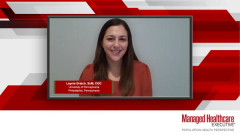
Approach to Genetic Testing in ALS
Various approaches to genetic testing for ALS are explored.
Episodes in this series

Jennifer Roggenbuck, MS, LGC: My approach to genetic testing in ALS [amyotrophic lateral sclerosis] is to offer comprehensive 1-step testing to all individuals with ALS. Some have proposed testing the most common gene first—for example, C9, which is by far the most common gene in North America. However, it’s not the most common gene in all populations. A single step of comprehensive testing, meaning a C9 test bundled with a multigene sequencing panel that covers the other ALS genes, is the best way to go because it will allow us to cover all those genes in 1 test, given that patients from different ethnic backgrounds and geoancestries might have a different likelihood of having 1 of those genes. This approach is the most equitable in terms of enabling us to provide the fastest genetic diagnosis to the largest number of patients. That’s the approach that I advocate, to offer to all patients with ALS after diagnosis.
Laynie Dratch, ScM, CGC: The approach to genetic testing tends to be that when anyone is diagnosed with ALS or when ALS is 1 of the top items on the differential, the individual diagnosed is offered a discussion with me, the genetic counselor, and I offer them genetic testing for the most common genetic causes of ALS. This includes a panel of ALS-related genes, like SOD1, FUS, TARDBP, and TBK1, as well as repeat expansion testing for the C9orf72 and ATXN2 genes. In our clinic, it’s important to offer all that testing up front rather than do a tiered or reflex approach because of the importance of early identification if someone is interested in clinical trials. There are very rare instances when an individual with more than 1 genetic cause has been identified, but that’s extremely uncommon and not the main reason we test in that way. It’s to streamline the process, to make sure patients get access to trials at the earliest possibility if that’s something they’re interested in.
Also, from a workflow perspective for both the provider and the patient, it’s easier than doing this reflex approach, which requires multiple visits to go over the results in a step-by-step process. In this way, I meet with the patient with ALS and whatever family members or support they have with them. We discuss the option for this testing, and then I meet with them to go over the results from that chunk of genes that we talked about—the ALS panel, C9, ATXN2—all at once. If this initial testing comes back and isn’t diagnostic, meaning it doesn’t find a genetic cause, in our clinic we offer every patient the opportunity to consider broader genetic testing. Something like exome or genome sequencing. Sometimes this can be much more costly than the initial testing. For that reason, sometimes it’s not an option for families. Many families think of it as a tool for right now but also for the future because once a patient has exome or genome sequencing complete, we have their entire DNA code spelled out. In the future, the lab can do what we call reanalysis. As new genes are discovered and new research is done, there’s a chance that when they reanalyze the data, a genetic etiology may be identified. That broader testing serves as a tool for the immediate present but also for the future. That’s something that we offer every patient if their initial testing hasn’t been diagnostic. This is for patients diagnosed with ALS, not for those who are asymptomatic.
The other thing we bring up for our families is the option of something called DNA banking. For a onetime storage fee, a lab can store someone’s DNA for many years. This can be a helpful tool for the family because a patient diagnosed may not want to know their genetic status. Or if they’ve had testing and it hasn’t given an answer, but they want to give family members the opportunity to do further testing, this allows for that. Even if the individual diagnosed is no longer living, they have a sample of DNA saved for their family for future testing. Not everybody will pursue DNA banking, but it’s something that families can absolutely order for themselves if they have interest in it.
Transcript edited for clarity.
Newsletter
Get the latest industry news, event updates, and more from Managed healthcare Executive.






















